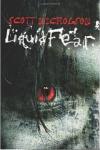Having sold hundreds of thousands of ebooks across more than 30 titles, bestselling novelist Scott Nicholson has to be one of the most successful and prolific indie authors today.
He also has to be one of the most generous – with both his readers and fellow authors.
In fact, when I only half-knowingly signed up for a free promo within Amazon’s KDP Select program (I was busy rearing my twin toddlers at the time: changing diapers, putting out fires, signing up for campaigns I knew nothing about) and discovered my own novel being downloaded by 10’s of thousands of people … **for free** … I flipped out and thought it was some kind of horrific error on Amazon’s part. After reaching out to Scott on Facebook, however, he explained what was happening, calmed me down, and guided me successfully through the promo.
So not only is Scott a great writer, he’s a generous human being. I will never forget the guidance he gave me at this critical time in my career.
Having published six of his titles traditionally, Scott now publishes his work primarily as an indie author. In fact, in The Indie Journey, he chronicles how he went from self-publishing his first e-book to becoming a full-time author in a little more than a year. It’s a great read for all novelists, specifically any considering going indie.
I recently had the pleasure of interviewing Scott about his approach to writing … as well as his personal definition of success. Here’s what he told me.
How long does it take you to complete the first draft of a novel?
Nicholson: It depends. Anywhere from 3 to 18 months. Faster is usually better.
Please elaborate.
Nicholson: I believe when writers are working faster, they are more instinctive and “in the zone,” without overthinking. You’re better able to pull stuff out of your subconscious mind. Of course, it’s good to revise a few times with your analytical cap on.
How many rewrites do you typically do?
Nicholson: I like to do three rewrites before I get it edited, and then make a final pass or two.
Do you have a writing schedule?
Nicholson: Occasionally, but nothing consistent. Usually I just make the time in the middle of everything else.
Do you have a daily page goal? Daily word goal?
Nicholson: I like a minimum of two pages. Less than that and I haven’t really gotten into the story.
Do you like the marketing aspect of being a novelist?
Nicholson: I love marketing. In many ways, it is far more challenging than writing, and takes just as much creativity.
Any words of advice concerning social media?
Nicholson: I think social media is a delicate balance. I get a lot more response when I say all the weird stuff I am thinking about than when I try to promote my books. So I don’t even promote anymore unless I am doing a giveaway of some kind.
Which of your titles has enjoyed the most sales? And why do you think it’s your top seller?
Nicholson: Liquid Fear has probably sold 100,000 copies now. It was a combination of timing, luck, and good marketing.
Amazon republished it just before Christmas in their Thomas & Mercer line so [it] got an extra boost. It’s the kind of twisting psychological thriller people either love or hate, not much in between.
What can fans expect next?
Nicholson: Right now I am working on a post-apocalyptic thriller called After, planning something completely new for its release. After that, I believe I am going to do an online e-serial with daily episodes released as I write it. And I need to write a third Fear book for Amazon.
How do you define success?
Nicholson: Success is personal. I’ve been around through the hard times and piled up 800 rejection slips. So I am little startled to see so many miserable writers right now, who entered during the easiest time in history to sell books and make money.
I just don’t see a lot of joy because many writers have an expectation of riches, forgetting the simple act of connecting with a reader. One reader, and daily progress on writing, is enough success for me.
Any advice you’d like to leave to aspiring novelists?
Nicholson: Really, writing is no easier or harder than putting one word after another, over and over, until you get it right. It may be the first time, it may take years.
Aspiring indie publishers?
Nicholson: As the song says, “Freedom’s just another word for nothing left to lose.” If you are willing to take full responsibility for your entire creative vision and resulting business, then self-publishing is the best thing that ever happened.
If you like someone else handling the grunt work, which is 95 percent of what a writing career is, then you’d better hope you get lucky and win the corporate-publishing lottery. A lot of writers aren’t going to make it past this Golden age. It comes down to how badly you want it.









